专业英语四级听写讲座
新英语四级考试CET-4听力讲座PPT课件
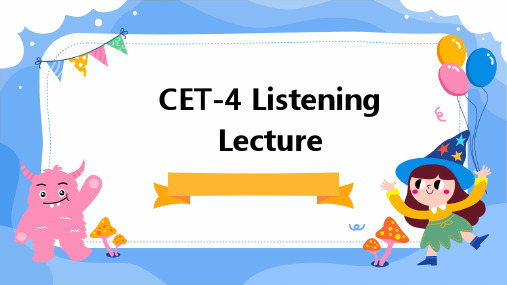
Before listening to the passage, quickly review the choices to get a sense of what the options are and what the question is asking.
CET-4 Lisew of Listening Examination • Listening skills explanation • Analysis of listening material types • Listening exam strategies and suggestions
Use context clues
Use contextual clues provided by the listening passage to help you fill in the blanks correctly.
03
Analysis of listening material types
04
Listening exam strategies and
suggestions
basic strategies
Understand the question types
Before the exam, make sure you understand the types of questions you will encounter in the listening section. This will help you to approach each question with the right strategy.
News reporting
最新大学英语四级考试讲座备课讲稿精品课件

Attending our club has substantial advantages. Firstly, it can improve your ability to deliver a speech which is of utmost significance to your future career and development. Secondly, it can help you to possess self-confidence, enrich your extra-curricula activities and make your campus life colorful. To sum up, the experiences in our club will be extraordinarily unforgettable throughout your life.
英语专业四级听写50篇(配合喜马拉雅录音)
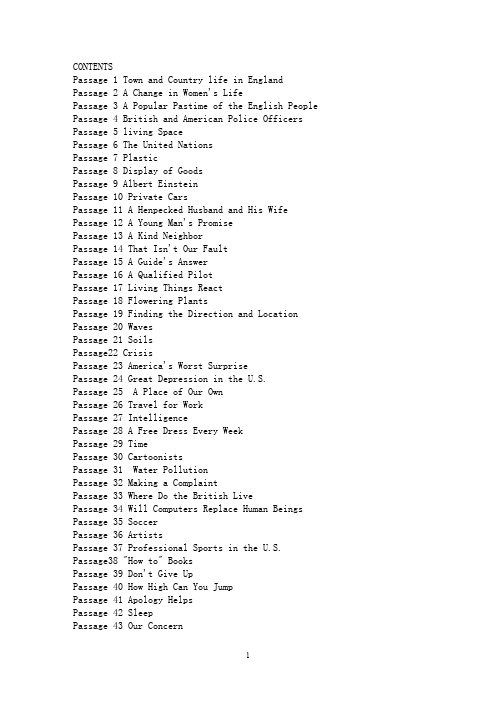
CONTENTSPassage 1 Town and Country life in England Passage 2 A Change in Women's LifePassage 3 A Popular Pastime of the English People Passage 4 British and American Police Officers Passage 5 living SpacePassage 6 The United NationsPassage 7 PlasticPassage 8 Display of GoodsPassage 9 Albert EinsteinPassage 10 Private CarsPassage 11 A Henpecked Husband and His Wife Passage 12 A Young Man's PromisePassage 13 A Kind NeighborPassage 14 That Isn't Our FaultPassage 15 A Guide's AnswerPassage 16 A Qualified PilotPassage 17 Living Things ReactPassage 18 Flowering PlantsPassage 19 Finding the Direction and Location Passage 20 WavesPassage 21 SoilsPassage22 CrisisPassage 23 America's Worst SurprisePassage 24 Great Depression in the U.S.Passage 25 A Place of Our OwnPassage 26 Travel for WorkPassage 27 IntelligencePassage 28 A Free Dress Every WeekPassage 29 TimePassage 30 CartoonistsPassage 31 Water PollutionPassage 32 Making a ComplaintPassage 33 Where Do the British LivePassage 34 Will Computers Replace Human Beings Passage 35 SoccerPassage 36 ArtistsPassage 37 Professional Sports in the U.S. Passage38 "How to" BooksPassage 39 Don't Give UpPassage 40 How High Can You JumpPassage 41 Apology HelpsPassage 42 SleepPassage 43 Our ConcernPassage 44 Gardening in AmericaPassage 45 The Influence of LifePassage 46 AutomobilesPassage 47 House and HomePassage 48 Population GrowthPassage49 Natural ResourcesPassage50 Reading1 Town and Country Life in EnglandThere is a big difference between town life and country life in England. In the country, everybody knows everybody else. They know what time you get up, what time you go to bed and what you have for dinner. If you want help, you will always get it and you will be glad to help others.In a large town like London, however, it can sometimes happen that you have never seen your next door neighbor and you do not know his name or anything about him. People in London are often very lonely. This is because people go to different places in the evenings and at weekends. If you walk through the streets in the centre of London on Sunday, it is like a town without people. One is sorry for old people living on their own .They could die in their homes and would not be discovered for weeks or even months. (154 words)Useful Words and Expressions:next door n. n.隔壁the neighbors next他 door隔壁邻居lonely adj .孤独的,寂寞的,偏僻的,人迹罕至的lonely life孤单的生活a lonely old man一位孤独的老人a lonely sand一个孤岛the loneliest night最孤独的夜晚on (one's) own独自;独立地;通过自己的努力She lives on her own.她一个人过。
2023年英语专业四级听写50篇完整版

英语专业四级听写50篇前言听写在英语专业四级统考中占有15%的比重,是考试的重要组成部分。
说起听写,正在准备和已经参与过英语专业四级考试的同学会说:“我能明白听写的内容,可写的时候就是跟不上!”“短文大意我明白,可是有的语我不会写。
”这只反映出了问题的两个方面。
一是听写速度不够快。
二是词汇量不够或词汇掌握得不够准确。
这些无疑是影响听写成绩的重要因素。
但是,这些不是问题的所有。
在从事听写教学及听写问卷过程中,很容易发现学生失分的具体问题:(1)没听懂,没听好,听写速度跟不上,写出的内容断断续续不连贯,学生因此大量失分;(2)有的词汇没听懂,拼写不够准确,这导致听写失分;(3)时态错误导致失分;(4)单复数不准确导致失分;(5)没有注意断句或专有名词,句子开头单词或专有名词错误使用大小写导致失分;(6)没有注意原文冠词的使用,书写时漏掉冠词导致失分;(7)没有注意单数第三人称形式导致失分;(8)没有注意单数复数名词的形式导致失分。
上述问题的产生有的是缺少训练导致的,如书写速度跟不上。
有的则是语言基础较差导致的,如听力较差没有完全听懂或没有掌握好词汇。
而单复数、大小写、冠词漏写等则多是粗心大意导致的。
听写部分能提高吗?当然能!并且提高的空间很大。
笔者从事英语专业基础教学与研究,从一开始所带的教学班参与四级考试超过全国院校平均通过率28.2个百分点,超过全国专业外语院校平均通过率12.5个百分点开始,所带的教学班在全国英语专业④级统考中通过率始终ito%,平均成绩、优秀率始终名列前茅。
最近一次所带的教学班参与四级统考,又考出了很好的成绩,通过率超过全国院校平均水平26石个百分点,超过全国专业外语院校13.6个百分点,并且在十几个平行班中平均成绩是最高的,优秀人数也是最多的。
在四级考试中,听写一项的成绩也不例外,每次均位居第一,本项目满分15分,所带班级平均成绩可以达成14分。
是不是学生基础很好?登记表白,和平行班相比所带班级入学时并不存在什么特别优势。
TEM4(听写讲座)

3、其他注意事项:大小写、标点和书写。字不 要追求好看,但是一定要保持头面的整洁,以 便于评阅,同样也能给阅卷老师留下一个好印 象。
ห้องสมุดไป่ตู้
Back
Exercises
Tape script 1: Social distance may affect how openly exployees speak about their work. / People of the same rank may talk frankly to one another about how things are going./ However, they may be less honest with someone higher up in the hierarchy / --for fear of prejudicing their position in the company./ For this reason, employees often alter the facts/ to tell the boss what he or she wants to hear./ One way of reducing social distance is to cut down the ways/ in which employees can indicate higher status./ Physical distance can affect how well people communicate./ The farther away one person is from another, the less often they communicate. / Some research has shown that when the distance is more than 10 meters, / the probability of communicating at least once a week is only 8%./ The most important thing for all managers to remember is that communication is a two-way process. / They should encourage their employees to ask questions / and to react to what the managers are saying./
专业四八级英语专业四级真题听力讲解精品PPT课件

happy with it. M: No, I certainly am not. W: Well, if I could just have the receipt. M: Oh, yes. Well, there is a slight problem about the receipt.
W: And what is that? M: Look. It says here that the noise from it should be undetectable by other
people. W: Yes, that’s right. M: But people can hear it, and t’s really embarrassing on the bus and
underground. W: Well, I’m sorry, but it must be the way you are wearing the headphones. M: Look. I know how to put earphones in my ears. Thank you very much. But
conversation?
M: You have been in a university before, haven't you?
W: Yes, in Britain.
M: How do students go about getting jobs when they graduate?
英语专业四级语法TEM4语法讲座省公开课金奖全国赛课一等奖微课获奖PPT课件

• 3.由同一动词组成短语如:come,go,set,break • 4.单个动词,抽象名词,形容词和副词多以近义词、同义词形式出
• 5.介词短语在句中作状语如:in terms of;with the exception of; in vain等,另外还应注意rather than,other than,such as,none /nothing+but
16/125
A.2 识别记忆同音异形异义词
• bear(熊)———bare (裸露), been (be过去式)———bean(蚕豆), • meet———meat, blew (blow过去式)———blue, cellar—seller, • higher———hire (雇用), write———right ,bread———bred (breed
• 2、表示否定意义前缀 (1)纯否定意义前缀有in-,dis-,non-,un-等,表示“无,非,不”之意, informal(非正式),dishonest(不老实),non-effective(无效 力),uncomfortable.(不舒适)等。 (2)表示错误意义前缀有mis-,(误,恶),mal-(坏)等 mis-understand (误解),malediction(诽谤)等。 (3)表示相反动作前缀有dis-(否定,相反),de-(离开,除去),un-(不,无)等,
过去式), • dear———deer(鹿), fined (fine过去式)———find, • flour(面粉)———flower , hall———haul(拖,曳), fir(冷却)———
可可英语 英语专四听写
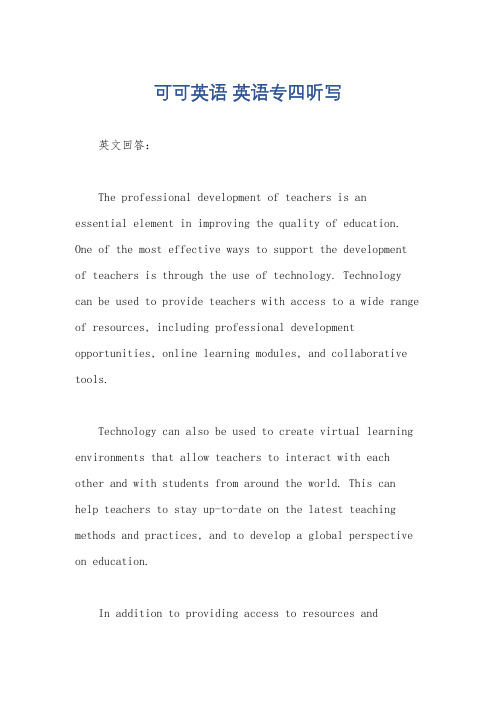
可可英语英语专四听写英文回答:The professional development of teachers is anessential element in improving the quality of education. One of the most effective ways to support the development of teachers is through the use of technology. Technology can be used to provide teachers with access to a wide range of resources, including professional development opportunities, online learning modules, and collaborative tools.Technology can also be used to create virtual learning environments that allow teachers to interact with each other and with students from around the world. This can help teachers to stay up-to-date on the latest teaching methods and practices, and to develop a global perspective on education.In addition to providing access to resources andcreating learning opportunities, technology can also beused to assess teacher development. Online assessments can be used to track teachers' progress, and to identify areas where they need additional support. This information can then be used to tailor professional development activitiesto the specific needs of individual teachers.The use of technology in teacher development has the potential to significantly improve the quality of education. By providing teachers with access to a wider range of resources, creating virtual learning environments, and enabling the assessment of teacher progress, technology can help teachers to develop the skills and knowledge they need to be effective educators.中文回答:教师的专业发展是提高教育质量的一个重要因素。
最新大学英语四级CET4应试技巧专题讲座-听力基础教学讲义ppt课件

/TI/, /TE/ They sawthe young and the old.
/jE/
Take your time.
/hI/, /I/
What did he do?
/mI/
Let me have a look.
弱读式 (23:40)
Now, _a_t_t_h_e_ end __o_f t_h_e__ morning _Y_o_u_’l_l __ all _b_e_ able ___ cotollect ____ taimetable ______fr_o_m_thceollege office. __Y_ou_’_ll__ see _t_h_e_ first lecture __i_s_a_t __ nine o'clock _i_n_t_he__ morning _a_n_d_th_e_ last _i_s_a_t _four o'clock __i_n_th_e__ afternoon. Most __o_f_y_o_u__, _i_n_ fact all _o_f_y_o_u__, _w_i_ll __ find __yo_u__ha_v_e_ spare time without lectures or laboratory sessions. _T_h_e__ college library __a_n_d_ private study rooms _a_re__ open all day _fr_o_m__ nine _i_n_t_he__ morning till eight _in__th_e_ evening _f_o_r _ private study. T_h_e_ students' union common room __is__ also open _a_t_t_he__ same times.
全国大学英语四级考试讲座学习教案
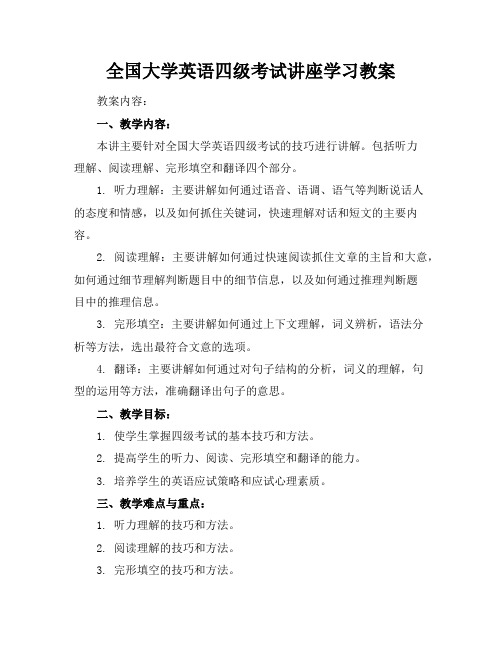
全国大学英语四级考试讲座学习教案教案内容:一、教学内容:本讲主要针对全国大学英语四级考试的技巧进行讲解。
包括听力理解、阅读理解、完形填空和翻译四个部分。
1. 听力理解:主要讲解如何通过语音、语调、语气等判断说话人的态度和情感,以及如何抓住关键词,快速理解对话和短文的主要内容。
2. 阅读理解:主要讲解如何通过快速阅读抓住文章的主旨和大意,如何通过细节理解判断题目中的细节信息,以及如何通过推理判断题目中的推理信息。
3. 完形填空:主要讲解如何通过上下文理解,词义辨析,语法分析等方法,选出最符合文意的选项。
4. 翻译:主要讲解如何通过对句子结构的分析,词义的理解,句型的运用等方法,准确翻译出句子的意思。
二、教学目标:1. 使学生掌握四级考试的基本技巧和方法。
2. 提高学生的听力、阅读、完形填空和翻译的能力。
3. 培养学生的英语应试策略和应试心理素质。
三、教学难点与重点:1. 听力理解的技巧和方法。
2. 阅读理解的技巧和方法。
3. 完形填空的技巧和方法。
4. 翻译的技巧和方法。
四、教具与学具准备:1. 教材:四级考试技巧讲解教材。
2. 课件:与教材内容相对应的课件。
3. 练习题:与教材内容相对应的练习题。
五、教学过程:1. 导入:通过一个小游戏,引起学生对四级考试的兴趣。
2. 讲解:根据教材内容,讲解听力理解、阅读理解、完形填空和翻译的技巧和方法。
3. 练习:让学生做一些与教材内容相对应的练习题,巩固所学知识。
4. 讨论:让学生讨论在做练习题时遇到的问题,教师进行解答。
六、板书设计:1. 听力理解技巧2. 阅读理解技巧3. 完形填空技巧4. 翻译技巧七、作业设计:1. 完成教材后的练习题。
2. 找一些四级考试的真题,进行模拟练习。
八、课后反思及拓展延伸:1. 课后反思:对本讲的讲解内容进行反思,看学生是否掌握了所学的技巧和方法。
2. 拓展延伸:让学生多做一些四级考试的练习题,提高学生的应试能力。
重点和难点解析:一、教学内容:本教案主要针对全国大学英语四级考试的技巧进行讲解,包括听力理解、阅读理解、完形填空和翻译四个部分。
2024年度最新全国大学四级考试讲座ppt精品课件

真题解析
分析历年真题,了解考点和出题规律, 总结答题技巧。
持续练习
保持每天一定的听力练习量,持续提高 听力水平。
11
03
阅读理解部分备考策略与 技巧
2024/3/24
12
阅读理解题型分析及解题步骤
01
题型概述:阅读理解部分主要包括主旨大意题、细节理解 题、推理判断题和词汇理解题等四种题型。
21
写作技巧指导
审题立意
认真审题,明确写作主题和要求, 确定文章立意。
谋篇布局
合理安排文章结构,包括开头、正 文和结尾三部分。
2024/3/24
选词造句
选用恰当的词汇和句型,注意语言 的准确性和丰富性。
检查修改
检查文章是否符合要求,修改语法 错误和拼写错误。
22
模拟题训练及真题解析
模拟题训练
通过模拟题训练,熟悉考试题型和难度,提高解题速度和准确性。
2024/3/24
02
选择与真题难度相当的模拟题进行训练。
严格按照考试时间和要求完成模拟题。
03
17
模拟题训练及真题解析
• 认真核对答案,分析错题原因,总结经验教训。
2024/3/24
18
模拟题训练及真题解析
真题解析 分析文章结构、题型特点和解题技巧。
2024/3/24
选择历年真题进行解析。 总结真题规律和趋势,为备考提供指导 。
最新全国大学四级考试讲座 ppt精品课件
2024/3/24
1
目录
• 考试概述与重要性 • 听力部分备考策略与技巧 • 阅读理解部分备考策略与技巧 • 翻译和写作部分备考策略与技巧
2024/3/24
2019年英语专业四级听力真题 演讲

Revision of Essay Drafts文章草稿的修改Good morning everyone.In today's lecture,I'm goin g to talk about how to revise essay draftsand give y ou some tips as well.The initial revision should,of c ourse,focus on the essay as awhole.大家早上好。
在今天的讲座中,我将谈一谈如何修改文章草稿,并且也会给出一些建议。
当然,最初的修改应该把重点放在文章的整体上。
You'd ask yourself:do I reach my writing objective? Does my essay directly answer thequestion?Is my m ain idea clear?In order to answer these questions,w hat you need to do firstis to revise for content.The t ypical rough draft may have too little and too much content allat the same time.It will have touched the surface of some portions of the essay withoutprovid ing adequate explanation or convincing detail.At t he same time,it may havediscussed things that do n ot contribute significantly to your major points.你会问自己:我是否达到了写作目标?我的文章是否直接回答了这个问题?我的中心思想清楚吗?为了回答这些问题,你首先需要做的是修改内容。
2019年英语专业四级听力真题 演讲

Revision of Essay Drafts文章草稿的修改Good morning everyone.In today's lecture,I'm goin g to talk about how to revise essay draftsand give y ou some tips as well.The initial revision should,of c ourse,focus on the essay as awhole.大家早上好。
在今天的讲座中,我将谈一谈如何修改文章草稿,并且也会给出一些建议。
当然,最初的修改应该把重点放在文章的整体上。
You'd ask yourself:do I reach my writing objective? Does my essay directly answer thequestion?Is my m ain idea clear?In order to answer these questions,w hat you need to do firstis to revise for content.The t ypical rough draft may have too little and too much content allat the same time.It will have touched the surface of some portions of the essay withoutprovid ing adequate explanation or convincing detail.At t he same time,it may havediscussed things that do n ot contribute significantly to your major points.你会问自己:我是否达到了写作目标?我的文章是否直接回答了这个问题?我的中心思想清楚吗?为了回答这些问题,你首先需要做的是修改内容。
陈汉生新编专业四级考试指南听写文本
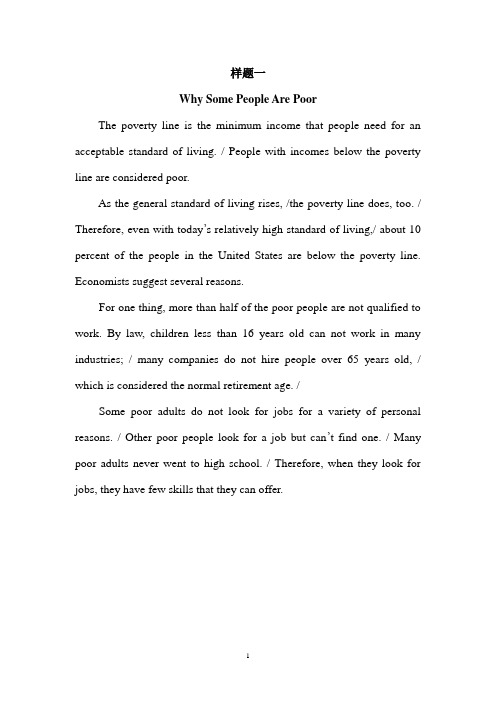
Why Some People Are PoorThe poverty line is the minimum income that people need for an acceptable standard of living. / People with incomes below the poverty line are considered poor.As the general standard of living rises, /the poverty line does, too. / Therefore, even with today’s relatively high standard of living,/ about 10 percent of the people in the United States are below the poverty line. Economists suggest several reasons.For one thing, more than half of the poor people are not qualified to work. By law, children less than 16 years old can not work in many industries; / many companies do not hire people over 65 years old, / which is considered the normal retirement age. /Some poor adults do not look for jobs for a variety of personal reasons. / Other poor people look for a job but can’t find one. / Many poor adults never went to high school. / Therefore, when they look for jobs, they have few skills that they can offer.Camping HolidaysTo many people, camping seems to be an ideal way of spending a holiday. / Not only is it cheaper, / it can also be far more convenient and enjoyable. /If you have young children, / camping has particular advantages. /There is always plenty for them to do, / and they enjoy the freedom of camping compared to the discipline of staying in a hotel. / Above all, camping provides a complete change for everyone, / and afterwards you return refreshed to your normal way of life./To some people, however, all these advantages are outweighed by the disadvantages,/ Such people will point out that on a camping holiday the mother still has to cook for everyone. /What is worse, she has to prepare meals / without the help of all the equipment in her kitchen at home. / Under bad weather, there may be too many flies and mosquitoes. / For these people a holiday in a hotel is well worth the extra expense.Old AgeMany people mistakenly believe that ole age is a time of increased illness and loneliness. / In fact, people do not suddenly change / when they reach the age of 60 or 65. / Consequently, we should not expect more mental illness / among the 60 and 70 age group than among the 50 to 60. / Furthermore, although more parents and their married children live in separate households than ever before, / this is usually by choice. / It is not because children now tend to neglect their parents / when they become old./It is also wrong to believe that old age seriously affects a person’s mental abilities. / There is clear proof that people who were eager to learn and who welcomed new experiences in their middle age, / continue to do so in old age. / It is true that older people tend to take longer to learn something new than young people. / Nevertheless, if they are given sufficient time, / they learn as well as young people do.Cars in the FutureAs big cars cause many problems, such pollution, shortage of parking space, crowded traffic, / scientists are now trying to design some small cars / that may some day replace today’s big automobiles. / If more people begin to drive such cars in the future, / there will be less air pollution. / There will also be more space for parking cars in cities, / and the streets will be less crowded. / Three such cars can fit in the space / that in now needed for one car of the usual size. / The little cars will cost much less to own and to drive. / Driving will be safer as these cars can go only 60 kilometers per hour./The cars of the future will be fine for driving around the city./ However, they will not be suitable for long trips, / because these cars by petrol can only go 450 kilometers/ before needing to stop for refilling.Dining Customs in the USAAmericans, like many people elsewhere in the world, like to invite friends to their homes / for an evening of food, drink and conversation. / Formal dinners in fine homes and hotels in the U. S. are much the same as formal dinners anywhere in the world. / But as most people in tge U. S. have no servants, / their dinner parties at home tend to be informal. / Guests may sit down at a table, / or, as many new small homes have no separate dining room or very small dining space, / guests can also serve themselves and eat in the living room, / holding their plates or trays on their knees. / A more enjoyable form of entertainment is the picnic. / Americans are great picnickers / and almost every family has a picnic basket. / Summer invitations are often for a picnic at a park or in the open countryside. / Unless hamburgers or hot dogs are cooked over a fire, / picnic food is usually cold.GardeningGardening is one of the oldest of the arts. / The Chinese with their deep sensitiveness to beauty / laid the foundations for a form of garden art / which was later to have great influences upon other lands. / The Greeks gave to the world a new concept of gardening. / Their homes were decorated with flowers, / but it was in their civic design that they most skillfully applied their garden art. / Their temples were surrounded by rows of trees,/ and trees lined the important streets and market places in their principal cities. / The Romans acquired much of the knowledge and skill in garden craft from Greeks. / In the second century AD the Romans began to build gardens of great scale, / inspired by the vast palace gardens they had conquered. / They brought water from great distances to supply the ornamental fountains / which decorated their villa gardens. / Later these great villas were to inspire the Italian garden architects to follow the Roman style.How and Why We SleepIt’s apparent that everyone needs to sleep. / However, most people rarely think about how and why they sleep. / We know that if we sleep well, we feel rested. / If we don’t sleep enough, we often feel tired and irritable. / It seems there are two purposes of sleep: / physical rest and emotional and psychological rest. / We need to rest our bodies and our minds, / both of which are important in order for us to be healthy. / Each night we alternate between two kinds of sleep: active sleep and passive sleep. / The passive sleep gives our body the rest and prepares us for active sleep, / in which dreaming occurs./Throughout the night, people alternate between passive and active sleep. / The brain rests, then it becomes active, then dreaming occurs. / The cycle is repeated several times throughout the night. / During eight hours of sleep, people dream for a total of one and half hours on the average.Airplane EnginesIn 1945 a new type of airplane engine was invented. / It was much lighter and more powerful than earlier engines, / and enabled warplanes to fly faster and higher than ever. / This type of engine was called the jet engine / because it blows a large jet of hot air backwards at high speed. / The first airplane to use the new jet engine was built in Britain / and it began carrying passengers in 1952. / It had two jet engines and flew much higher than petrol-engine airplanes. / At this height the air is thinner and very cold, / and so the airplane can cut through the air more easily. / However, the cabin has to be air-conditioned and has to be at normal pressure / so that the passengers may eat, read and sleep in comfort. / Today all long-distance airplanes have jet engines. / The modern jet airplanes are very big and can carry hundreds of passengers on two different floor, / which makes air travel much cheaper.Railways in BritainThe success of early railways, such as the lines between big cities, / led to a great increase in railway building in Victorian times. /Between 1835 and d1865 about 25,000 kilometers of track were built, / and over 100 railway companies were created./Railway travel transformed people’s lives,/ Trains were first designed to carry goods. / However, a law in the 19th century forces railway companies to run one cheap train a day / which stopped at every station and cost only a penny a mile. / Soon working class passengers found they could afford to travel by rail. / Cheap Day Excursion trains became popular and seaside resorts grew rapidly./The railways also provided thousands of new jobs; / building carriages, running the railways and repairing the tracks./Railways even changed the time. / The need to run the railways on time meant that local time was abolished / and clocks showed the same time all over the country.United Nations DayThe 24th of October is celebrated as United Nations Day. / It is a day that belongs to everyone, / and it is celebrated in most countries of the world. / Some countries celebrate for a week instead of a day. / In many parts of the world, schools have special programmes for the day. / Boys and girls in some communities decorate a UN tree. / In other communities, young people put on plays about the UN. / Some libraries exhibit children’s art works from around the world. / Schools celebrate with the songs and dances of other countries, / or give parties where foods of other countries are served./No matter how the day is celebrated, / the purpose of these celebrations is to help everyone understand the UN / and the important roles it plays in world affairs./The UN encourages people to learn about other lands and their customs. / In this way, people can gain a better understanding and appreciation of peoples all over the world.。
大连理工大学出版社冲击波系列英语专业四级听写50篇

练习评分标准英语专业四级统考听写部分的评分不是根据写出的单词个数多少,而是以是否表达清楚原文的主要意思为依据,而是以错误数量进行评判。
即小错,如大小写、标点符号、冠词错误等扣0.25分,大错,如漏写、加词、造词、换词(换冠词按小错记),单复数、拼写、时态错误等,扣0.5分。
听写的全部内容根据意群分成15分,每个意群最多扣一分。
根据这样的标准,在参加听写考试时有必要分清重点和非重点,如果在听的过程中有个别词或词组一下反应不出来,就不要苦苦纠缠单个的词,要跟着录音进行下一个意群的听写,避免个别词、句的错漏影响对其它内容的听音。
在平常练习中,要求大家听写完毕后根据提供的听写文字认真检查自己书写的内容,标出所有的错误,并统计得分。
然后将自己的情况如实填写到表格中以有效监控自己的进步情况,有意识地减少常见错误。
注:无法通过听音识别出来的分段等不会扣分。
Passage 1 Town and Country Life in EnglandThere is a big difference between town life and country life in England. In the country, everybody knows everybody else. They know what time you get up, what time you go to bed and what you have for dinner. If you want help, you will always get it and you will be glad to help others.In a large town like London, however, it can sometimes happen that you have never seen your next door neighbor and you do not know his name or anything about him. People in London are often very lonely. This is because people go to different places in the evenings and at weekends. If you walk through the streets in the centre of London on Sunday, it is like a town without people. One is sorry for old people living on their own. They could die in their homes and would not be discovered for weeks or even months. (154 words)Passage 2 A Change in Women’s LifeThe important change in women’s life-pattern has only recently begun to have its full effect on women’s economic position. Even a few years ago most girls left school at the first opportunity, and most of them took a full time job. However, when they married, they usually left work at once and never returned to it. Today the school-leaving age is sixteen, many girls stay at school after that age, and though women tend to marry younger, more married women stay at work at least until shortly before their first child is born. Very many more afterwards return to full-time or part-time work. Such changes have led to a new relationship in marriage, with the husband accepting a greater share of the duties and satisfactions of family life and with both husband and wife sharing more equally in providing the money, and running the home, according to the abilities and interests of each of them. (154 words)Passage 3 A Popular Pastime of the English PeopleOne of the best means of understanding the people of any nation is watching what they do with their non-working time.Most English men, women and children love growing things, especially flowers. Visitors to England in spring, summer, or autumn are likely to see gardens all the way along the railway lines. There are flowers at the airports and flowers in factory grounds, as well as in gardens along the roads. Each English town has at least one park with beautifully kept flower beds. Public buildings of every kind have brilliant window boxes and sometimes baskets of flowers are hanging on them.But what the English enjoy most is growing things themselves. If it is impossible to have a garden, then a window box or something growing in a pot will do. Looking at each other’s gardens is a popular pastime with the English. (144 words)Passage 4 British and American Police OfficersReal policemen, both in Britain and the U.S. hardly recognize any common points between their lives and what they see on TV – if they ever get home in time.Some things are almost the same, of course, but the policemen do not think much of them.The first difference is that a policeman’s real life deals with the law. Most of what he learns is the law. He has to know actually what actions are against the law and what facts can be used to prove them in court. He has to know nearly as much law as a lawyer, and what’s more, he has to put it into practice on his feet, in the dark and, running down a narrow street after someone he wants to talk to.Little of his time is spent in talking with beautiful girls or in bravely facing cruel criminals. He will spend most of his working life arranging millions of words on thousands of forms about hundreds of sad, ordinary people who are guilty –or not of stupid, unimportant crimes. (177 times)Passage 5 Living SpaceHow much living space does a person need? What happens when his space needs are not met? Scientists are doing experiments on rats to try to determine the effects of overcrowded conditions on man. Recent studies have shown that the behavior of rats is greatly affected by space. If rats have enough living space, they eat well, sleep well and produce their young well. But if their living conditions become too crowded, their behavior and even their health change obviously. They can not sleep and eat well, and signs of fear and worry become clear. The more crowded they are, the more they tend to bite each other and even kill each other. Thus, for rats, population and violence are directly related. Is this a natural law for human society as well? Is enough spacenot only satisfactory, but necessary for human survival? These are interesting questions. (147 words)Passage 6 The United NationsIn 1954, representatives of 50 nations met to plan this organization. It is called the United Nations. After the war, many more nations joined.There are two major parts of the United Nations. One is called the General Assembly. In the General Assembly, every member nation is represented and has an equal vote.The second part is called the Security Council. It has representatives of just 15 nations. Five nations are permanent members: the United States, Russia, France, Britain, and China. The 10 other members are elected every two years by the General Assembly.The major job of the Security Council is to keep peace in the world. If necessary, it can send troops from member nations to try to stop little wars before they turn into big ones.It is hard to get the nations of the Security Council to agree on when this is necessary. But they id vote to try to stop wars.Passage 7 PlasticWe use plastic wrap to protect our foods. We put our garbage in plastic bags or plastic cans. We sit on plastic chairs, play with plastic toys, drink from plastic cups, and wash our hair with shampoo from plastic bottles.Plastic does not grow in nature. It is made by mixing certain things together. We call it a produced or manufactured material. Plastic was first made in the 1860s from plants, such as wood and cotton. That plastic was soft and burned easily.The first modern plastics were made in the 1930s. Most clear plastic starts out as thick, black oil. That plastic coating inside a pan begins as natural gas.Over the years, hundreds of different plastics have been developed. Some are hard and strong. Some are soft and bendable. Some are clear. Some are many-colored. There is a plastic for almost every need. Scientists continue to experiment with plastics. They hope to find even ways to use them!Passage 8 Display of GoodsAre supermarkets designed to persuade us to buy more?Fresh fruit and vegetables are displayed near supermarket entrances. This gives the impression that only healthy food is sold in the shop. Basic foods that everyone buys, like sugar and tea, are not near each other. They are kept in different aisles so customers are taken past other attractive foods before they find what they want. In this way, shoppers are encouraged to buy products that they do not really need.Sweets are often placed at children’s eye level at the checkout. While parents are waiting to pay, children reach for the sweets and put them in the trolley.More is bought from a fifteen-foot display of one type of product than from a ten-foot one. Customers also buy more when shelves are full than when they are half empty. They do not like tobuy from shelves with few products on them because they feel there is something wrong with those products that are there.Passage 9 Albert EinsteinAlbert Einstein was born in Germany in 1879. his father owned a factory that made electrical devices. His mother enjoyed music and books. His parents were Jewish but they did not observe many of the religion’s rules. Albert was a quiet child who spent much of his time alone. He was slow to talk and had difficulty learning to read. When Albert was five years old, his father gave him a compass. The child was filled with wonder when he discovered that the compass needle always pointed in the same direction – to the north. He asked his father and his uncle what caused the needle to move. Their answers about magnetism and gravity were difficult for the boy to understand. Yet he spent a lot of time thinking about them. He said later that he felt something hidden had to be behind things.Passage 10With the increase in the general standard of living, some ordinary Chinese families begin to afford a car. Yet opinions of the development of a private car vary from person to person.It gives a much greater degree of comfort and mobility. The owner of a car is no longer forced to rely on public transport, and hence no irritation caused by waiting for buses or taxis. However, others strongly object to developing private cars. They maintain that as more and more cars are produced and run in the street, a large volume of poisonous gas will be given off, polluting the atmosphere and causing actual harm to the health of people.Whether private cars should be developed in China is a difficult question to answer, yet the desire for the comfort and independence a private car can bring will not be eliminated.Passage 11 A henpecked Husband and His wifeThere was once a large, fat woman who had a small, thin husband. He had a job in a big company and was given his weekly wages every Friday evening. As soon as he got home on Friday, his wife used to make him give her all his money, and then she used to give him back only enough to buy his lunch in his company everyday.One day, the small man came home very excited. He hurried into the living-room. His wife was listening to the radio and eating chocolates there.“You will never guess what happened to me today, dear.” He said.He waited for a few seconds and then added, “I won ten thousand dollars on the lottery!”“That is wonderful!”said his wife delightedly. But then she pulled a long face and added angrily, “but how could you afford to buy the ticket?”Passage 12 A Y oung Man’s PromiseOne day a young man was writing a letter to his girl friend who lived just a few miles away in a nearby town. He was telling her how much he loved her and how wonderful he thought shewas. The more he wrote, the more poetic he became. Finally, he said that in order to be with her he would suffer the greatest difficulties, he would face the greatest dangers that anyone could imagine. In fact, to spend only one minute with her, he would swim across the widest river, he would enter the deepest forest, and he would fight against the fiercest animals with his bare hands.He finished the letter, signed his name, and then suddenly remembered that he had forgotten to mention something quite important. So, in a postscript below his name, he added: “By the way, I’ll be over to see you on Wednesday night, if it doesn’t rain.”Passage 13 A Kind NeighborMr. and Mrs. Jones’ apartment was full of luggage, packages, furniture and boxes. Both of them were very busy when they heard the doorbell ring. Mrs. Jones went to open it and she saw a middle-aged lady outside. The lady said she lived next door. Mrs. Jones invited her to come in and apologized because there no place for her to sit. “Oh, that’s OK.” said the lady. “I just come to welcome you to your new home. As you know, in some parts of this city neighbors are not friendly at all. There are some apartment houses where people don’t know any of their neighbors, not even the ones next door. But in this building everyone is very friendly with everyone else. We are like one big happy family. I’m sure you’ll be very happy here.” Mr. and Mrs. Jones said, “But madam, we are not new dwellers in this apartment. We’ve lived here for two years. We are moving out tomorrow.”Passage 14 That Isn’t Our FaultMr. and Mrs. Williams got married when he was twenty three, and she was twenty. Twenty five years later, they had a big party, and a photographer came and took some photographs of them.Then the photographer gave Mrs. Williams a card and said, “They’ll be ready next Wednesday. You can get them from studio.”“No,” Mrs. Williams said, “please send them to us.”The photographs arrived a week later, but Mrs. Williams was not happy when she saw them. She got into her car and drove to the photographer’s studio. She went inside and said angrily, “You took some photographs of me and my husband last week, but I’m not going to pay for them.”“Oh, why not?” the photographer asked.“Because my husband looks like a monkey,” Mrs. William said.“Well,” the photographer answered, “that isn’t our fault. Why didn’t you think of that before you married him?”Passage 15 A Guide’s AnswerIn 1861, the Civil War started in the United States between the Northern and the Southern states. The war continued with great bitterness until 1865, when the Northerners were victorious. However, even today, many Southerners have not forgotten their defeat, or forgiven the Northerners.A few years ago, a party of American tourists were going round one of the battlefields of the Civil War with a guide who came from one of the Southern states. At each place, the guide told thetourists stirring stories about how a few Southern soldiers had conquered powerful forces of Northerners there.At last, one of the tourists, a lady who came from the North, stopped the guide and said to him, “But surely the Northern army must have won at least one victory in the Civil War?”“Not as long as I’m the guide here, madam.” answered the Southern guide.Passage 16 A Qualified PilotThe captain of a small ship had to go along a rocky coast, but he was unfamiliar with it, so he tried to find a qualified pilot to guide him. He went ashore in one of the small ports, and a local fisherman pretended that he was a pilot because he needed some money. The captain took him on board and asked him where to steer the ship.After half an hour the captain began to suspect that the fisherman did not really know what he was doing and where he was going.“Are you sure you are a qualified pilot?” he asked.“Oh, yes,” answered the fisherman. “I know every rock on this part of the coast.”Suddenly there was a terrible crash from under the ship. At once the fisherman added, “And that’s one of them.”Passage 17 Living Things ReactYou and all organisms live in an environment. An environment is made up of everything that surrounds an organism. It can include the air, the water, the soil, and even other organisms.An organism responds to changes in its environment. When an organism responds to a change, it reacts in certain ways. All living things respond in some way.Have you ever noticed how plants and insects respond to light? Plants bend toward light. Insects fly toward light.Living things also respond in other ways. The leaves on some trees respond to a change in season. In autumn, they change colors and then fall off the branches. Animals also respond to a change in season. Squirrels save nuts for the winter. Bears sleep through the winter in a cage.You respond to your environment in many ways, too. You may shiver if you are cold. What other ways do you respond to changes in your environment?Passage 18 Flowering PlantsWhat are the parts of a flower?Flowers can have male parts and female parts. The female parts make eggs that become seeds. The male parts make pollen. Pollen is a powdery material that is needed by the eggs to make seeds. To make seeds, pollen and eggs must come together. The wind, insects, and birds bring pollen to eggs. Many animals love flowers’ bright colors. They also like a sugary liquid in flowers. This is called nectar. While they drink nectar, pollen rubs off on their bodies. As they move, some of this pollen gets delivered to the female flower parts.Over time, the female parts turn into fruits that contain seeds. Animals often eat the fruits and the seeds pass through their bodies as waste. The animals do not know they are working for the plants by planting seeds as they travel to different places!Passage 19 Finding the Direction and LocationHow can you tell which direction? By day, look for the Sun. it is in the east in the morning and the west in the afternoon. At night, use the Big Dipper to help you find the North Star. It would be better to bring a compass because its needle always points north.How do you know how far you have gone? You could count every step. Each step is about two feet. You’d better wear a pedometer which is a tool that counts steps. If you know where you started, which direction you are heading, and how far you have gone, you can use a good map to figure out exactly where you are.Today there is a new way for travelers to figure out where they are. It is the GPS. It has 24 satellites that orbit the earth and constantly broadcast their positions. Someday you may carry a small receiver as you hike and use GPS to find out if you are there yet.Passage 20 WavesHow does light get from the sun to the earth? How does music get from the stage to the audience? They move the same way – in waves.Light and sound are forms of energy. All waves carry energy, but they may carry it differently. Light and sound travel through different kinds of matter. For example, light waves cannot move through walls, but sound waves can. That is why you can hear people talking in another room even though you cannot see them. The energy of some waves is destructive. An earthquake produces seismic waves.Catch a wave. Ask a friend to stand a few feet away from you. Stretch a spring between you. Shake the spring to transfer energy to it. What happens? The spring bounces up and down in waves. When the waves reach your friend, they bounce back to you!Light waves travel 300,000 kilometers (186,000 miles) per second! They can also travel through a vacuum. That is why light from the sun and distant stars can travel through space to the earth.Passage 21 SoilsThere are many different kinds of soils. Different soils have different types of rock and minerals in them. Some soils have more water in them than others. Some soils might have more plant and animal material in them, too.Different kinds of soils are found in different parts of the world. There are several kinds of soils found in the United States. In some areas, the soil has a lot of clay. Other soils are very sandy. Loam is a kind of soil that has a good mixture of clay and sand.In some places, soil layers are very thick. Lots of plants grow in places with a thick soil layer. In dry and windy places soil layers are much thinner. Layers of soil on mountains are thin because gravity pulls the soil downhill.The type of soil in a particular place affects what kinds of plants can grow there.Passage 22 CrisisLife is a contest! Who will win? A bluebird and sparrow both compete for space to build their nests. A fast-growing maple tree and slower-growing dogwood compete for the sunlight they bothneed. Oil competes with coal and nuclear power as an energy sources for electric power plants.There is a problem. There is a limited amount of space for birds, sunlight for trees, and energy for people! If we do not cut back on our uses of some of our resources, someday they will be gone.How can we use energy today and know we will have enough to go around in the future? We can choose alternate, or replacement, energy resources. It takes the earth millions of years to create coal, oil, and gas. They are nonrenewable resources.Solar energy, wind energy and water energy are renewable. What other ways can we conserve our resources? How can we make sure there is always enough to go round?Passage 23 American’s Worse SurpriseDecember 7, 1941 was one of the worst days in American history. Nearly all Americans who are old enough to remember that day can still remember what they were doing at the moment they heard “the news”. The news was that America had been attacked.Shortly before 2:00 P.M, a radio dispatch came into Washington from Honolulu, Hawaii. “Air Raid, Pearl Harbor –This is no drill.”Japanese planes had begun an attack on the largest American military base in the Pacific. They first destroyed planes on the ground. Then they bombed the ships in the harbor.No one had expected the attack. So no one was prepared for it. And it did not take long for the Japanese to do their damage. When the smoke cleared, the Navy counted its losses. Eighteen ships had been sunk or badly damaged. Nearly 150 planes had been destroyed. More than 2400 Americans had been killed and more than 1200 wounded.Passage 24 Great Depression in the U.SIn 1929, the bills started to come in. American industry had produced too many goods. Americans could not afford to buy all of them. So factories had to cut down on their production. Many workers lost their jobs. Investors tried to get their money back. But businesses did not have enough money to pay them. Banks tried to get their money back from investors. But the investors could not pay, either. Too many people owed money. And few of them could pay their bills.During the next few years, business got worse and worse. By 1932, banks all over the country were closing.People without money could not buy goods, so more businesses closed. More and more people lost their jobs. By 1932, more than 12 million Americans were jobless. Millions more were earning barely enough to live on. The country was in a great depression they had never experienced before.Passage 25 A Place of Our OwnWe are all usually very careful when we buy something for the house. Why? Because we have to live with it for a long time. We paint a room to make it brighter, so we choose the colors carefully.We buy new curtains in order to match the newly decorated room, so they must be the right color. We move the furniture round so as to make more space – or we buy new furniture – and so on. It is an endless business.Rich or poor, we take time to furnish a room. Perhaps some people buy furniture in order to impress their friends. But most of us just want to enjoy our surroundings. We want to live as comfortably as we can afford to. We spend a large part of our lives at home. We want to make a small corner in the world which we can recognize as our own.Passage 26 Travel for WorkYou can see them in every airport in the world. They are businessmen and women who have to travel for their work.When they first applied for the job, they may have thought of good food and hotels, huge expense accounts and fashionable cities. Now they have to sit in airport lounges, tired anduncomfortable in their smart clothes, listening to the loudspeaker announce “The flight to Tokyo, or Berlin, or New York is delayed for another two hours.” Some people say to me, “How lucky you are to be able to travel abroad in your work! You can go sightseeing without paying any money by yourself!” They think that my job is like a continual holiday. It is not.There are advantages, of course, and I do think I am lucky, but only because I can go to places I would never visit if I was a tourist.Passage 27 IntelligenceAre some people born clever, and others born stupid? Or is intelligence developed by our environment and our experience?Strangely enough, the answer to these questions is yes. To some extent our intelligence is given us at birth, and no amount of special education can make a genius out of a child born with low intelligence. On the other hand, a child who lives in a boring environment will develop his intelligence less than one who lives in rich and varied surroundings. Thus, the limits of a person’s intelligence are fixed at birth, whether or not he reaches those limits will depend on his environment. This view, held by most experts now, can be supported in a number of ways. As is easy to show that intelligence is to some extent something we are born with. The closer the blood relationship between two people is, the closer they are likely to be intelligence.Passage 28 A Free Dress every WeekThe temptation to steal is greater than ever before especially in large shops and people are not so honest as they once were.A detective recently watched a well-dressed woman who always went into a large store on Monday mornings. One Monday, there were fewer people in the shop than usual when the woman came in, so it was easier for the detective to watch her. The woman first bought a few small articles. After a little time, she chose one of the most expensive dresses in the shop and handed it to an assistant who wrapped it up for her as quickly as possible. The woman simply took the parcel and walked out of the ship without paying. When she was arrested, the detective found out that the shop assistant was her daughter. Believe it or not, the girl gave her mother a free dress every week!Passage 29 TimeTime is tangible. One can gain time, spend time, waster, save time, or even kill time. Common questions in American English reveal this concrete quality as though time were a possession. “Do you have any time?”“Cam you get some time for this?”“How much free time do you have?” The treatment of time as a possession influences the way that time is carefully divided.Generally, Americans are taught to do one thing at a time and may be uncomfortable when an activity is interrupted. In businesses, the careful scheduling of time and the separation of activities are common practices. Appointment calendars are printed with 15, 30, and 60 minute time slots. The idea that “there is a time and place for everything” extends to American social life. Visitors who drop by without prior notice may interrupt their host’s personal time. Thus, calling friends on the telephone before visiting them is generally preferred to visitors’ dropping by.Passage 30 CartoonistsIn a good cartoon, the artist can tell in a few lines as much as a writer can tell in half a dozen paragraphs. The cartoonist not only tells a story but he also tries to persuade the reader to his way of thinking. He has great influence on public opinion. In a political campaign, he plays an important part. Controversial issues in Congress or at meetings of the United Nations may keep the cartoonist well-supplied with current materials.A clever cartoonist may cause laughter because he often uses humor in his drawings. If he is sketching a famous person, he takes a prominent feature and exaggerates it. Cartoonists, for instance, like to lengthen an already long nose and to widen an already broad grin. This exaggeration of a person’s characteristics is called caricature. The artist uses such exaggeration to put his message across.Passage 31 Water PollutionWater is very important to us. Factories and plants need water for industrial uses and large pieces of farmland need it for irrigation. Without water to drink, people die in a short time.Today most water sources are so dirty that people must purify water before drinking. Water becomes dirty in many ways: industrial pollution is one of them. With the development of industry, plants and factories pour tons of industrial wastes into rivers every day. The rivers have become seriously polluted, and the water is becoming unfit for drinking or irrigation. The same thing has also happened to our seas and oceans. So, the problem of water pollution is almost worldwide.Scientists of many countries have done a lot of work to stop pollution. The polluted water in some places has become clean and drinkable gain. Perhaps one day the people in all towns and cities will be drinking clean water. That day, we believe, is not very far off.附相关词汇:Agricultural pollution air(borne) pollution aquatic pollution atmospheric pollution Community pollution dust pollution environment pollution food pollutionFreshwater pollution global air pollution ground water pollution indoor air pollution Information pollution ocean pollution noise pollution nuclear pollution visual pollutionPassage 32 Making a ComplaintComplaining about faulty goods or bad service is never easy. But if something you have bought is faulty or does not do what was claimed for it, you are not asking for a favor to get it put right.Complaints should be made to a responsible person. Go back to the shop where you bought the goods, taking with you any receipt you may have. In a small store the assistant may also be the owner so you can complain direct. In a chain store, ask the manager. If you telephone, ask the name of the person who handles your enquiry, otherwise you may never find out who dealt with the complaint later. If you do not want to do it in person, writer a letter. Stick to the facts and keep a copy of what you write. At this stage you should give any receipt numbers, but you should not need to give receipts or other papers to prove you bought the article.Passage 33 Where Do the British LiveNearly everyone in Britain would like to own their own home and, whether they do or not, they are prepared to put time and money into decorating and furnishing it or even making structural alternations to it. Because of the climate and because of the expense involved in going。
- 1、下载文档前请自行甄别文档内容的完整性,平台不提供额外的编辑、内容补充、找答案等附加服务。
- 2、"仅部分预览"的文档,不可在线预览部分如存在完整性等问题,可反馈申请退款(可完整预览的文档不适用该条件!)。
- 3、如文档侵犯您的权益,请联系客服反馈,我们会尽快为您处理(人工客服工作时间:9:00-18:30)。
5. 听写是个相对机械、容易操做的测试手段,但提高听写决不是一朝一夕,靠突击就可以的,加强相关能力训练,能够间接促进听写水平,同时,由教师或个人有计划有目的的反复实践听写,也可以促进巩固各项语言知识,发展运用知识的熟巧,促使语言能力向交际能力转化。
专业英语四级听写讲座
Ⅰ简介
1. 教学大纲要求:
根据《高等院校英语专业基础阶段英语教学大纲》对听写项目的要求:在全面理解所听内容的基础上准确无误地逐字逐句写出全文。并要求拼法和标点符号正确无误,错误率不超过8%。
根据高校英语专业四级考试大纲的要求,听写部分要求考生:
1. 能在全面理解内容的基础上逐字逐句写出所听材料;
1. 语言知识方面:
首先,必须提高听力水平,熟悉英美国家的说话发音的不同方式,语音语调;其次对于大纲中所列单词和短语,不仅要认知,而且会熟练拼写;由于朗读中没有念出分段或标点,因此考生听后,要根据对篇章的理解来判断选择。另外考生可以利用二读三读时的停顿,一般地说,二读时,某个意群如有停顿,接下去是另一意群,那么两者之间可能有符号,如逗号,也可能没有,要看两者的关系,若是回读(三读)该意群,那么这之后肯定是表示完整的一句结束了,因此最有可能是句号。此外,要充分利用语法知识进行分析,如单复数是否一致﹑上下文时态是否相配﹑大小写是否恰当﹑介词搭配或词语用法是否合乎规范﹑前后语意内容是否通顺等。
听写部分共占时大约15分种,计分15分,比重15%。全文大约150词左右,为一段或多段,共分15个意群,每个意群可能是词组,分句或单句。全文共朗读四遍。第一遍为正常速度,每分钟录音速度为大约120词,要求考生此时从整体理解全文内容,抓住中心大意,准确写出所听内容;第四遍跟第一遍一样,仍为每分钟约120词,考生可边听边校对。全文听完后,有两分钟的复查时间,直到录音中听到“That's the end of dictation”,表示这一部分结束,该进行下一项听力内容了。
根据评分方式,学会取舍。因为听写的评分不是根据写出的单词个数多少而是以是否表达清楚原文的主要意思为依据,然后以是否有小的错误,如单复数﹑大小写﹑定冠词等分层次扣分,也就是说,扣分有主要和次要信息之分,因此听的时候也要分清重点和非重点;另外听写的全部内容根据意群分成15分,每个意群最多扣一分,如果在听的过程中有个别词或词组一下反应不出来,就不要苦苦纠缠单个的词,要跟着录音进行下一意群的听写,避免个别词或句的错漏影响对其它内容的听音。
III.提高听写能力的建议
针对听写的考试现状,考生如何提高听写成绩呢?
1. 考前要充分了解听写的形式,最好进行一次模拟实践,体会全过程。
2 根据朗读方式,选用相应的书写技巧。如在听第一遍时,重点听主题思想、重点词,掌握全局概念,不要一听录音就写,也许能写出前边的单词或句子,却有可能不知全文的大意;听第二遍和第三遍是以句子为单位重复的,在第二遍朗读录音时,要以意群为单位去理解,因时间关系,不可能一字一字地全部写下,所以要分清主次信息,抓句型和关键词(主语、谓语等),在听第三遍时,再把其它如修饰语、定冠词等遗漏内容补上,若有些词还来不及写,可用一些自己认识的缩略形式,甚至符号先代替,等最后一遍或复查两分钟时再恢复原形。因为评分不是以写出的单词多少而是先以是否原文的主要意思表达清楚,然后以是否有小的错误,如单复数,大小写,定冠词等扣分不同。如果在听的过程中有个别词或词组一下反应不出来,就不要苦苦纠缠单个的词,要跟着录音进行下一意群的听写,因为阅卷是以15个意群分割成15分,每个意群最多扣一分,所以个别词或句的错或漏不会影响其它的得分。而对于听不懂的单词,不妨写下音标,等回头检查时可再想。
3. 运用期待语法的作用。听之前,根据题目展开联想,调集大脑中储藏的相关信息,同时仔细理解第一句,因为首句常是主题句,后边的句子围绕它进一步展开,这样,可以适当缩小范围,便于更快的入戏。
4. 听写是一项综合性的语言技能,包含了诸如听、写、单词量、语法结构、篇章理解、记忆力等各方面, 因此,提高听写,关键就是加强各种相关知识和技能的训练。这也就牵扯到平时对各门功课的学习。如提高听力水平,熟悉英美国家的说话发音的不同方式,语音语调,这是必要条件,但同时,如何把接收到的信息转化为自己的并产出,则要求其它的能力的配合,如对词汇的掌握及熟练程度,词语搭配,运用语法知识,有时即使没听出来,也可补写出来。如单复数、时态等;还可利用逻辑推理能力,因为所听材料都是有意义的独立成文的,所以,检查中如发现不合逻辑思维的句子,可以肯定所写有误,进而更正。
这一项采用多项选择题的形式,主要测试学生获取口头信息的能力,分Section A, Section B和Section C三节。而听力材料的内容与日常生活和学习活动息息相关,VOA和BBC新闻材料为学生所熟悉的一般新闻报道、短评或讲话等等。
2. 考试大纲要求:
根据1997年出版的《高等院校英语专业基础阶段英语考试大纲》(修订本):TEM-4考试采用的是录音式标准听写,除了有时题目印在答题纸上,要求考生根据磁带中的内容,在15分钟内在全面理解所听内容的基础上准确无误地写出全文。全文大约150词左右,为一段或多段,共分15个意群,每个意群可能是词组,分句或单句。
通过几年的抽样数据分析,不难看出这几年来参加考试的人数以每年超过10%的速度递增,考试的总体成绩也有所提高。而其中很重要的便是听写成绩的上升,直接影响了最后的总成绩。然而每年仍有不少人这单项只得零分,对照教纲中对此的要求:错误率不超过8% 相差甚远,如若以60%的通过率来算,也应以9分为最低要求,然而结果仍不理想。
充分利用听写的朗读方式,选用相应的书写技巧。如:在听第一遍时,重点听主题思想,重点词,掌握全局概念,不要一听录音就写,否则也许能写出前边的单词或句子,却有可能不知全文的大意;第二遍和第三遍是以句子为单位重复的,以意群为单位停顿的,在听第二遍录音时,因时间关系,不可能一字一字地全部写下,所以要分清主次信息,重点抓句型结构和关键词等,在听第三遍时,再把其它次要信息如修饰语﹑定冠词等遗漏内容补上;在听最后一遍(四遍)时最后仔细核对。
6. 最后,还要注意书写的整洁、清晰,用原珠笔或钢笔按要求书写,以便于评阅。
听写的选材广泛而不生辟,体裁可以为叙述性,描写性,或说明性,难度适中,不超出与听力理解部分的同等难度,词汇以大纲要求的前四级为主,也有一些五﹑六级词汇,但不会出现太偏僻的人名﹑地名等专有名词或词汇,背景知识要求不会太复杂,不会超出大部分学生应该掌握的常识。
听写部分占时共约15分种,原始分为15分,比重占全部的15%。
听写的录音由英美国家的专家专门录制,或英式或美式,但要求不带地方口音。全文共朗读四遍。第一遍为正常速度,约120词/每分钟,要求考生此时从整体理解全文内容,抓住中心大意,而不要着急写;第二、 三遍为慢读,根据意群停顿,停顿时间大约15秒,要求考生准确写出所听内容;第四遍语速跟第一遍一样,仍为每分钟约120词,考生可边听边校对。全文听完后,有两分钟的复查时间。
3. 同样,在第四遍结束后的两分钟复查时间里,不会很好地利用分析逻辑能力对有些明显的或介词搭配或词语进行校正,小错不断,或丢词,或写出的内容前后不通顺;
4. 由于朗读中没有念出标点,而是靠学生自己听,判断选择,于是就出现全文没有标点符号,没有大小写,或所有的停顿处都是一种符号,或中文标点混用在英文短文里的情况。
2. 拼写和标点符号正确无误,错误率不超过8%。
这一项为主观试题。其目的是测试学生的听力理解能力、拼写熟练程度以及正确运用标点符号的能力。所听材料的题材广泛,题材多样。长度约150个单词。听写时共念四遍。第一遍用正常速度朗读,录音语速为每分钟120个单词,让学生听懂材料大意。第二、三遍朗读时意群、分句和句子之间留出约15秒的空隙,让学生书写。第四遍再用正常速度朗读,让学生检查。
II.听写的成绩及错误分析
作为标准参照性质考试中的听写部分,教学及考纲对其的标准是:在全面理解所听内容的基础上准确无误地逐字逐句写出全文。并要求拼法和标点符号正确无误,错误率不超过8%。这也就是对二年级下英语专业学生的要求,那么考生这几年的实际情况如何呢?下边是几年来的听写成绩:
1994年对于8个高中低院校的600个考生进行抽样统计,其中349个考生在听写中得零分,占58.%。95年全部考试人数中有1583个人得零分,占11.7%。96年有744人,占4.7%。
II. 建议
听写,顾名思义,既听又写,它渗透在各种形式的语言活动中,是最常用到的基本功之一。听写测试要求考生把听到的内容准确无误地以笔头的形式表达出来,虽无需考生自己遣词造句,但由于牵涉到语言(听力﹑单词拼写﹑篇章结构等)与非语言能力(如记忆力﹑速记等)也决非易事。提高听写能力,关键就是加强各种相关知识和技能的训练。
2. 非语言能力方面:
加强记忆和速记能力。有时候,听的内容都懂了,但由于记忆的问题或时间的问题没写下来,因此在平时的训练中,有意识地不是以单个的词而是以意群为单位进行理解和记忆;在短暂的停顿空间,如果时间来不及,可以选用自己熟悉的缩写形式或符号记录,等以后有时间时再复原。这种速记能力也要靠平时的多练,才能获得。
简单的数字,隐藏着形形色色的错误,在笔者所经历的阅卷过程中,听写中的几个明显错误是:
1. 考生对这种标准听写形式的陌生, 对听写材料进行改写甚至发挥到加工成作文;
2. 不知如何利用第一遍听音时把握全文的大意(top-down approach), 而着急写,丢了西瓜捡芝麻(bottom-up),只见部分单词而缺少骨架结构;
听力部分要求考生:
1. 能听懂英语国家人士关于日常生活和社会生活的谈话,以及中等难度(如TOEFL中的短文)的听力材料,能理解大意,领会说话者的态度、感情和真实意图;
